The resuscita - Study guides, Class notes & Summaries
Looking for the best study guides, study notes and summaries about The resuscita? On this page you'll find 46 study documents about The resuscita.
Page 4 out of 46 results
Sort by
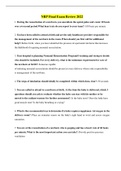
-
NRP Final Exam Review 2022
- Exam (elaborations) • 11 pages • 2022
-
- $15.49
- + learn more
NRP Final Exam Review 2022 1. During the resuscitation of a newborn, you auscultate the apical pulse and count 10 beats over a 6 second period. What heart rate do you report to your team?: 100 beats per minute 2. You have been called to attend a birth and are the only healthcare provider responsible for the management of the newborn in the room. When should you first call for additional help?: Before birth, when you have identified the presence of a perinatal risk factor that increases ...
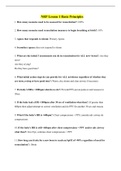
-
NRP - Lessons 1-9 quizzes Answered 2022 Exam Pack
- Exam (elaborations) • 27 pages • 2022
-
- $15.49
- + learn more
NRP - Lessons 1-9 quizzes Answered 2022 Exam Pack/ NRP Lesson 1 Basic Principles 1. How many neonates need to be assessed for resuscitation?: 100% 2. How many neonates need resuscitation measures to begin breathing at birth?: 10% 3. Apnea that responds to stimm: Primary Apnea 4. Secondary apnea: does not respond to stimm 5. What are the initial 3 assessments you do in resuscitation for ALL new- borns?: Are they term? Are they crying? Do they have good tone? 6. What initial...
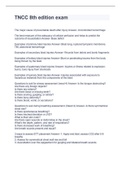
-
TNCC 8th edition exam with complete solution
- Exam (elaborations) • 4 pages • 2022
- Available in package deal
-
- $8.49
- + learn more
TNCC 8th edition exam with complete solution
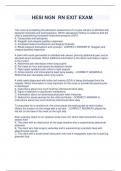
-
HESI NGN RN EXIT EXAM
- Exam (elaborations) • 33 pages • 2023
- Available in package deal
-
- $16.49
- + learn more
HESI NGN RN EXIT EXAM The nurse is completing the admission assessment of a 3-year old who is admitted with bacterial meningitis and hydrocephalus. Which assessment finding is evidence that the child is experiencing increased intracranial pressure (ICP)? A. Tachycardia and tachypnea B. Sluggish and unequal pupillary responses C. Increased head circumference and bulging fontanels D. Blood pressure fluctuations and syncope - CORRECT ANSWER-B. Sluggish and unequal pupillary responses A ...
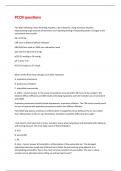
-
PCCN questions with verified answers
- Exam (elaborations) • 37 pages • 2023
-
- $7.99
- + learn more
PCCN questions Two days following a near-drowning accident, a pt is dyspneic, using accessory muscles, expectorating large amounts of secretions and reporting feeling of impending death. Changes to the assessment data include RR- 24 TO 36 CXR clear to bilateral diffuse infiltrates ABG 40% face mask or 100% non-rebreather mask pO2 120 mm Hg to 56 mm Hg pCO2 33 mmHg to 56 mmHg pH 7.42 to 7.35 HCO3 24 meq/L to 27 mEq/L Which of the ff do these changes most likely represent A. aspirati...
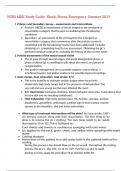
-
NURS MISC Study Guide: Shock/Burns/Emergency Summer 2019,100% CORRECT
- Exam (elaborations) • 26 pages • 2023
-
- $15.49
- + learn more
NURS MISC Study Guide: Shock/Burns/Emergency Summer 2019 1. Primary and Secondary Survey—assessments and interventions. • Primary: ABCDE an assessment of the pt triaged to the emergent or resuscitation category that focuses on stabilizing like threatening conditions. • Secondary: an assessment of the pt triaged to the emergent or resuscitation category that commences after the primary survey is completed and life-threatening insults have been addressed. Includes obtaining v/s, compl...

-
NURS MISC Study Guide: Shock/Burns/Emergency Summer 2019,100% CORRECT
- Exam (elaborations) • 26 pages • 2023
-
- $15.49
- + learn more
NURS MISC Study Guide: Shock/Burns/Emergency Summer 2019 1. Primary and Secondary Survey—assessments and interventions. • Primary: ABCDE an assessment of the pt triaged to the emergent or resuscitation category that focuses on stabilizing like threatening conditions. • Secondary: an assessment of the pt triaged to the emergent or resuscitation category that commences after the primary survey is completed and life-threatening insults have been addressed. Includes obtaining v/s, compl...
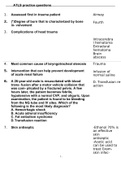
-
ATLS practice questions.
- Exam (elaborations) • 86 pages • 2023
- Available in package deal
-
- $13.49
- + learn more
1. Assessed first in trauma patient Airway 2. (*)Degree of burn that is characterized by bone in- volvement Fourth 3. Complications of head trauma Intracerebral hematoma Extradural hematoma Brain abscess 4. Most common cause of laryngotracheal stenosis Trauma 5. Intervention that can help prevent development of acute renal failure 6. A 26-year-old male is resuscitated with blood trans- fusion after a motor vehicle collision that was com- plicated by a fractured pelvis. A few ho...
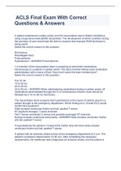
-
ACLS Final Exam With Correct Questions & Answers
- Exam (elaborations) • 13 pages • 2023
-
- $12.99
- + learn more
A patient experiences cardiac arrest, and the resuscitation team initiates ventilations using a bag-valve-mask (BVM) resuscitator. The development of which condition during the provision of care would lead the team to suspect that improper BVM technique is being used? Select the correct answer to this question. Rib fracture Esophageal injury Pneumothorax Hypertension - ANSWER Pneumothorax 1 A member of the resuscitation team is preparing to administer medications intravenously to a pat...
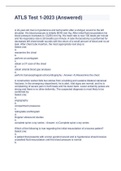
-
ATLS Test 1-2023 (Answered)
- Exam (elaborations) • 15 pages • 2023
-
- $14.99
- + learn more
A 22-year-old man is hypotensive and tachycardic after a shotgun wound to the left shoulder. His blood pressure is initially 80/40 mm Hg. After initial fluid resuscitation his blood pressure increases to 122/84 mm Hg. His heart rate is now 100 beats per minute and his respiratory rate is 28 breaths per minute. A tube thoracostomy is performed for decreased left chest breath sounds with the return of a small amount of blood and no air leak. After chest tube insertion, the most appropriate next st...

Do you wonder why so many students wear nice clothes, have money to spare and enjoy tons of free time? Well, they sell on Stuvia! Imagine your study notes being downloaded a dozen times for $15 each. Every. Single. Day. Discover all about earning on Stuvia


